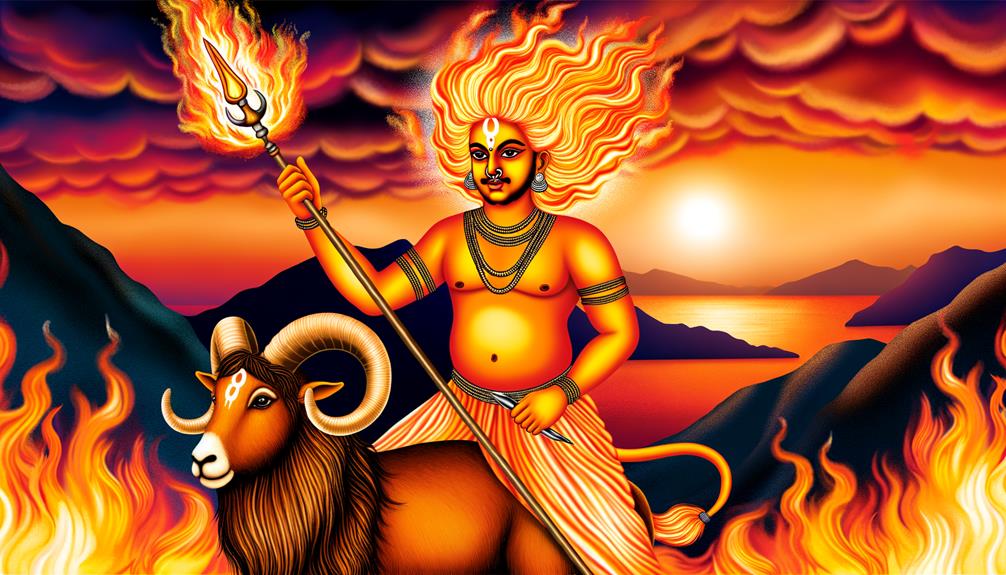Within the colourful world of Hindu mythology, there's a fascinating figure called Agni – the god of fire. This fiery deity isn't just a symbol of destruction, but also a symbol of purification and transformation. He's an important figure, acting as a divine messenger, delivering the prayers and offerings from humans to the gods in sacrificial rituals.
But you might wonder, why is Agni given such a prominent role in Hindu rituals? To understand this, we need to dig into ancient scriptures and traditions that shine a light on Agni's lasting importance.
Understanding Agni's Divine Origins

Dipping into the divine beginnings of Agni, it's interesting to see how this guardian deity of the southeast, usually found in the related corners of Hindu temples, is said to have originated from Prajāpati's forehead, perceived as the universe's primary source. The Vedic texts tell us that Agni, the fire god, is Brahma's eldest son. He holds a pretty high rank among the gods, coming in just behind Indra.
The Hindu fire god, Agni, exists at three levels: as fire on earth, as lightning in the atmosphere, and as the sun in the sky. This omnipresence showcases the 78 facets of Agni mentioned in holy texts. He's not only a celestial being but also a household deity, playing a crucial role in various Hindu practices. His presence is called upon to bless events ranging from weddings to cremations.
If we look at it from a comparative perspective, the importance of Agni in Hinduism is similar to the significance of fire gods in other cultures, highlighting the universal respect for fire. His beginnings and status accentuate the vital role of fire in both everyday life and the divine. Therefore, understanding Agni's divine origin gives us insight into the intricate and rich fabric of Hindu mythology.
Agni's Role in Hindu Rituals
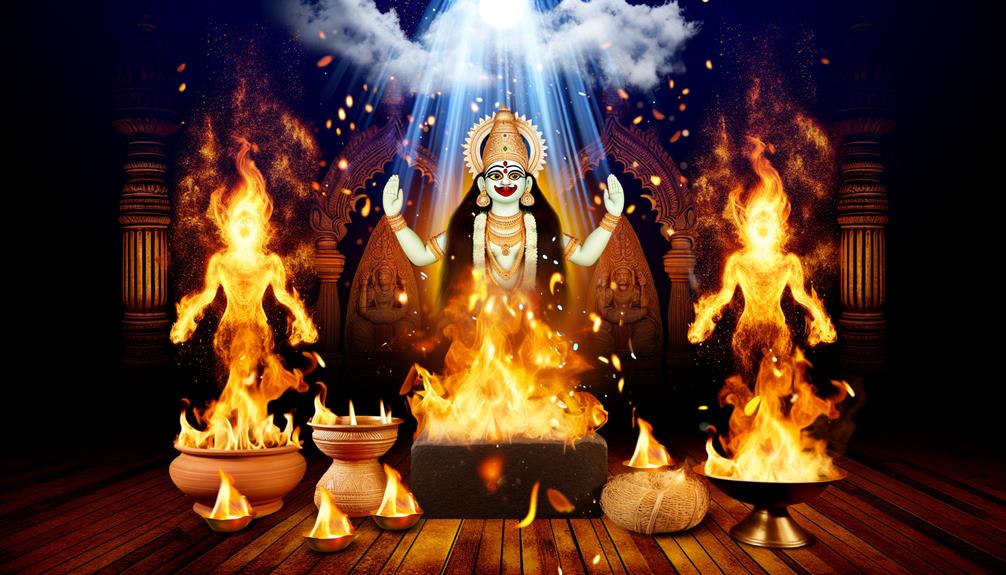
Let's talk about Agni's role in Hindu rituals. This fiery deity isn't just a highly respected figure. He's also a crucial go-between, thought of as the gods' mouthpiece, taking offerings to them during holy ceremonies. In Hinduism, fire represents purity. Therefore, Agni, the Fire God, is seen as a purifier and a transformer.
While looking into Agni's part in Hindu rituals, we can point out three main areas:
- Agni takes the stage in Vedic rituals, where ceremonial fires are kindled and offerings to deities are made through fire rituals.
- People worship Agni at home, a representation of the divine's presence in daily life.
- In Hindu weddings, Agni is the observer, and the fire of the funeral pyre, as per Vedic tradition, signifies the soul's freedom.
Agni's constant presence from birth to death in a Hindu's life is pretty unique. His involvement in these rituals re-emphasizes his importance and highlights the lasting importance of fire in Hindu tradition.
Understanding the role of Agni can help us appreciate the intricate weave of Hindu rituals and beliefs.
The Symbolism of Fire God
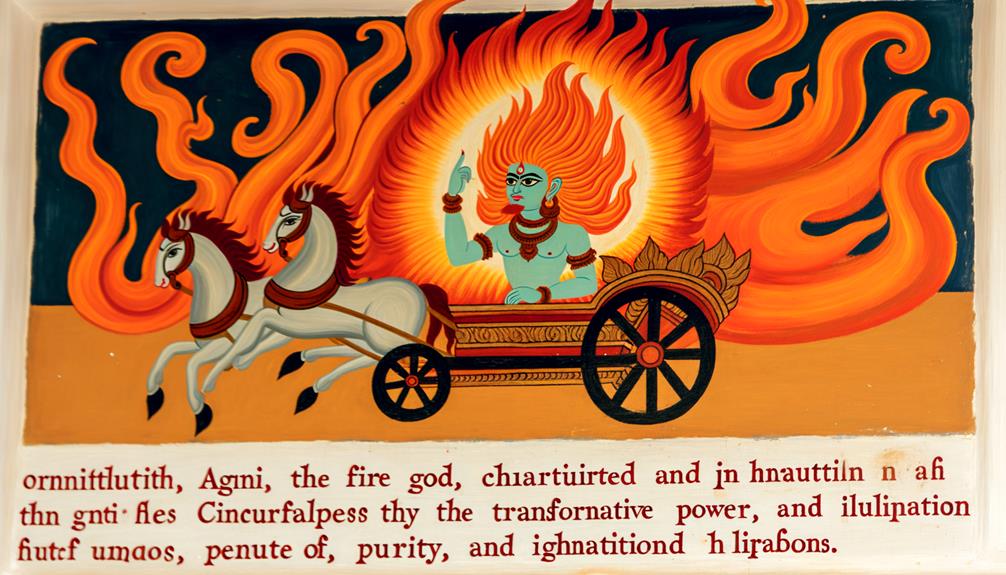
Let's delve into the symbolic universe of Agni, the Fire God. In Hindu tradition, Agni's influence extends far beyond religious ceremonies and permeates various facets of Hindu culture and daily life. Agni, often portrayed with hair aflame and astride a fiery chariot, is recognized as the Hindu deity of conflict.
The seven tongues of Agni are a representation of his ubiquity, as he consumes offerings and transports them to other gods. Additionally, Agni signifies the digestive fire within us, embodying transformation and change. This interpretation aligns with the portrayal of Agni in ancient Vedic scriptures, where he's seen as a linchpin between the tangible and the celestial, the human and the divine. Essentially, he's the internal fire, the life spark, the driving force within us.
Agni is illustrated as a heavenly fire in Hindu folklore, a divine glow that eradicates darkness and ignorance. He personifies purity and wisdom, lighting the way towards enlightenment. The symbolism of the fire god transcends the physical flames, indicating vigor, ardor, and metamorphosis.
The essence of Agni permeates every aspect of our existence, from the meals we consume to the sunlight that illuminates our world, constantly reminding us of the divine in all things.
Agni in Ancient Scriptures
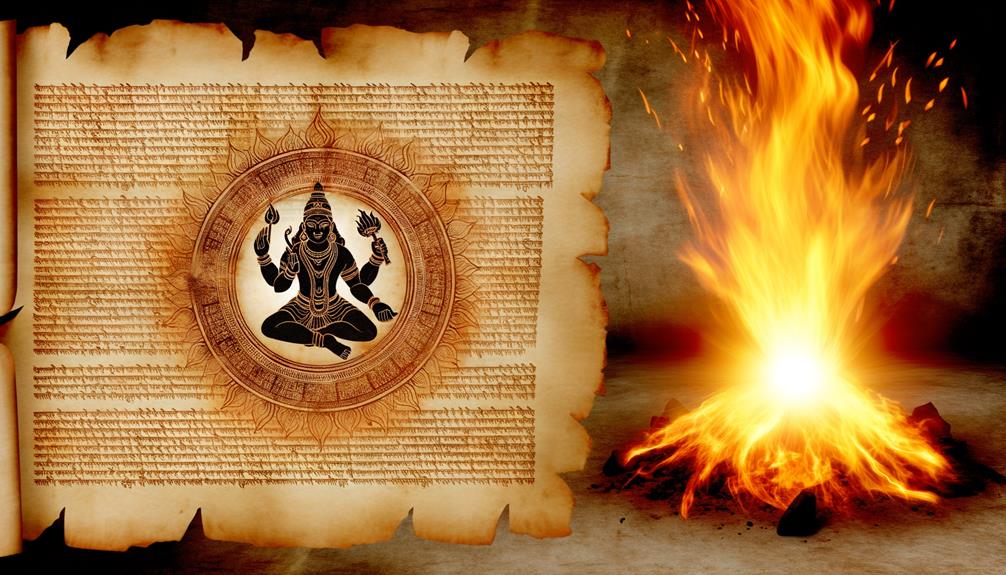
Let's have a chat about Agni, a pivotal character from ancient scriptures. He isn't just a fire god, he's also admired as the protector of the southeast direction and is a crucial part of Indian religious traditions. You'll see him popping up in a bunch of different roles throughout sacred texts from the Vedic era.
Now, let's delve into some points about Agni:
- In these historic texts, Agni is often seen as a messenger between humans and the divine. He's usually portrayed with two faces, embodying his dual role as both a destroyer and a benefactor. It's quite intriguing, don't you think?
- Agni also has a significant role in the Hindu tradition, particularly in the Saptapadi ritual. This ritual symbolizes the holy union of marriage, showing Agni's key role in important life events.
- Lastly, Agni is highly respected in Vedic hymns, ranking just below Indra. This spotlights his high standing among the deities.
Just remember, these ancient scriptures are full of rich symbolism and complex characters like Agni. They provide us with a unique window into the past, shedding light on the beliefs, traditions, and values of ancient societies.
Agni's Influence in Other Religions
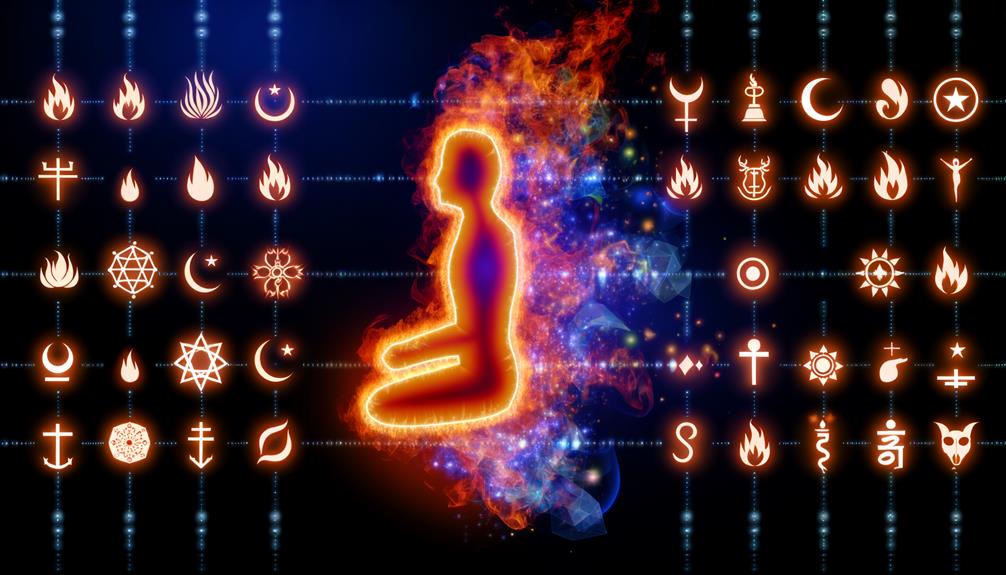
Let's have a chat about Agni's influence in various religions. You see, Agni isn't just a figure in Hinduism but plays a crucial part in other faiths like Buddhism and Jainism.
Agni, the deity of fire, isn't only central to Hindu customs but also holds a key position in Buddhism as one of the three primary elements. You'll often find him represented in the Senika heresy debate within Buddhist texts, which emphasizes the universal existence of fire within all humans.
Now, when it comes to Jainism, Agni's role is a bit different, but equally important. In this faith, he's connected with fire-bodied entities and goes by the name Tejas. Agni in Jainism is seen as a destroyer of ignorance, much like his transformative energy mentioned in the Visnu Purana.
Agni's influence isn't just limited to religious texts though. He's very much a part of our present-day yoga practices. Consider the daily Ashtanga routine, which is viewed as a fire sacrifice. Our bodies become the fire pit altar and our consciousness, the fire itself. The yoga poses we perform are much like the offerings given to Agni by the ancient sages using fire sticks, symbolizing a connection between humans and the divine beings.
This underlines the vital role of Agni, the fire god, in linking the mortal and divine worlds across diverse religious beliefs.
Frequently Asked Questions
What Does the Agni God of Fire Do?
So, you're wondering what the fire god Agni does in Hinduism? Well, Agni's responsibilities are quite diverse. One of his key roles is acting as a divine postal service, delivering offerings from humans to the other gods. Plus, his presence is felt everywhere – he's the fire we see on earth, the lightning streaking across the sky, and even the sun itself!
Why Is Agni so Important?
As a follower of Hinduism, I hold Agni in high regard. He represents the energy of life and serves as our link to the deities, enabling us to present our offerings. His presence is felt in all aspects of our lives, from sacred ceremonies like weddings to the final rites at cremations. He exemplifies the concept of purification and change.
What Power Does Agni Have?
Agni is a powerful figure who holds sway on three distinct planes: He personifies fire here on our planet, embodies lightning in our atmosphere, and symbolizes the sun up in the sky. Plus, he plays a pivotal role as a celestial courier, responsible for delivering human gifts to the gods.
Why Is the Fire Important in Hinduism?
Fire carries deep significance within the Hindu faith. It's viewed as a force for purification and sanctification, playing a vital role in events such as weddings or funerals. Additionally, it's revered as the chief receiver of offerings during rituals, marking a divine link.
Conclusion
Agni's divine origins and his ongoing significance are a fascinating study in the continuous thread running through Hindu tradition. His fiery symbol isn't just a myth but influences rituals and branches out into other religions too.
If you think about it, Agni is a lot like the fires he represents – the sun, lightning, the home hearth – his sway is everywhere, but we often don't notice it. Really, Agni is a perfect representation of the lasting and transformative power of fire.
But it's more than just an element; it's a divine presence that shapes our beliefs and experiences.

